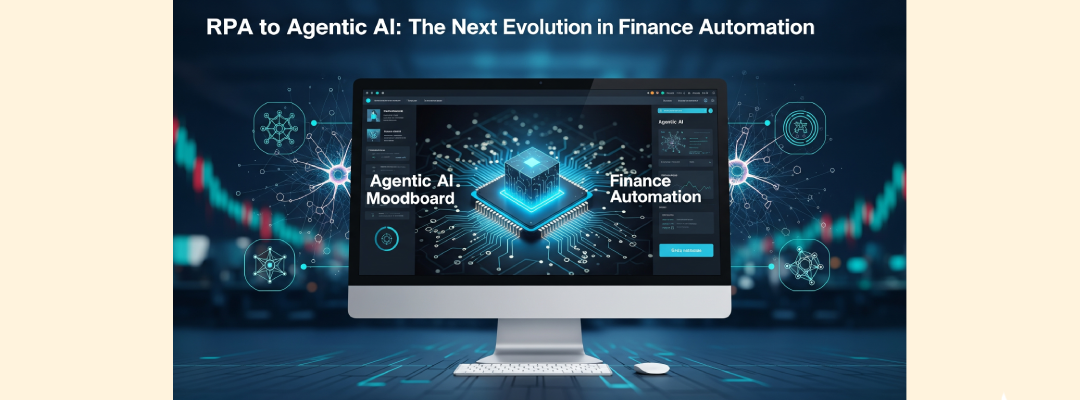Introduction
Remember when Robotic Process Automation (RPA) was hailed as the future of finance? It automated repetitive tasks—great for data entry and invoice matching, but hit a wall with complex, dynamic scenarios. Now, agentic AI is pushing those boundaries, enabling systems to think, learn, and act autonomously in real time. This progression is vital for a Digital Marketing Agency in Bangalore or Digital Marketing Agency in Mumbai managing financial workflows, as it gears operations toward scalable efficiency and strategic insight.
Why This Topic Matters
- RPA still covers only 30–40 % of financial tasks—leaving complex decisions untouched.
- Agentic AI dramatically boosts output—processes like wire transfers and expense reimbursements see ~40 % faster completion, 94 % fewer errors.
- BFSI in India is embracing autonomy—agentic AI moves finance, risk, and operations forward with adaptive automation.
- Big Four innovation—Deloitte and EY’s launches show 25 % cost savings and 40 % productivity gains in finance.
Clearly, the shift from RPA to agentic AI marks a pivotal transformation in finance management.
1. From RPA to Agentic AI – The Evolution
- RPA: Executes rule-based tasks—data logging, invoice entry, reconciliation—but lacks adaptability.
- Intelligent Automation (IA): Enhances RPA with AI—includes ML and NLP, improving accuracy and speed .
- Agentic AI: Multi-step autonomous agents that plan, learn, reason, and execute—bridging automation gaps and offering dynamic decision-making.
2. Finance Use Cases: Smarter, Faster, Safer
Invoice & PO Processing
Agentic AI flags inconsistencies, approves routine cases, escalates exceptions—streamlining end-to-end invoice lifecycles .
Cash Reconciliation
AI agents track payments, reconcile with ledgers, and handle exceptions automatically—cutting manual intervention by 50–70 %.
Compliance & Risk Management
In Anti-Money-Laundering (AML), agentic AI reviews low-risk alerts autonomously and auto-documents decisions—boosting compliance efficiency.
Budgeting & Reporting
AI agents extract ERP data, generate audit-ready reports, and can even trigger alerts for anomalies (trullion.com). One study showed 94 % drop in error rates.
Investment Decisions
Banks use agentic AI for real-time portfolio shifts and risk assessment—leveraging unstructured data and market signals . Analysts still guide strategy—this is augmentation, not replacement .
3. Benefits: What Finance Teams Gain
| Benefit | What It Means |
| Scalability | Handles surges without hiring more personnel |
| Accuracy & Compliance | Near-zero error and human oversight built-in |
| Strategic Focus | Teams shift from chores to analysis and insight |
| Speed & Resilience | Processes adapt in real-time to data changes |
4. Getting Started: Framework for Transition
- Audit processes: Pinpoint high-volume, repetitive finance tasks.
- Pilot agentic AI: Begin with invoice processing or cash reconciliation.
- Integrate RPA + agentic agents: Let bots prep work for AI decision-makers (blueprintsys.com).
- Embed governance: Define risk thresholds—when to escalate to finance managers.
- Track KPIs: Measure speed, cost savings, error rates.
- Scale thoughtfully: Expand into budgeting, credit analysis, investment assistants.
5. Challenges to Address
- Data quality matters: Garbage in, garbage out—ensure you feed clean, labeled financial data.
- Governance & transparency: Implement audit trails and human-in-loop checks.
- Legacy integration: Bridge agentic systems into existing ERPs and financial platforms.
- Ethics & bias: Regularly assess for decision bias, especially in AML or credit scenarios.
Conclusion
Agentic AI is the next frontier in finance automation. It’s not about replacing RPA—it’s about evolving beyond it, unlocking autonomous, intelligent financial workflows. For a Digital Marketing Agency in Bangalore or Digital Marketing Agency in Mumbai, this means faster invoices, smarter reporting, and finance teams free to strategize. Transition smartly, start small, and build governance into the DNA—and you’ll drive real impact and growth.
Does this interest you? Connect with us to see how we can help you!
FAQs
- What’s the difference between RPA and agentic AI?
RPA follows rules; agentic AI reasons, learns, and decides autonomously. - What finance tasks benefit the most?
Invoicing, reconciliation, compliance, reporting, and investment analytics. - How fast are results?
Up to 40% faster processing, 94% fewer errors in trials. - Does it replace finance jobs?
No—agentic AI shifts workforce toward oversight and strategy. - What’s needed to start?
Clean data, automation tools, governance, pilot plan. - Is integration tough?
With orchestration platforms, agentic AI complements—not disrupts—ERPs. - What about compliance?
Real-time audit logs and human review reduce risk. - Who’s doing it now?
Banks, Big Four consultancies, BFSI in India, and progressive finance teams. - How do I measure ROI?
Look at cost saved, error reduction, speed improvement, and staff focus shifts. - What’s next after finance?
Broader enterprise use: sales ops, HR, supply chain—all using agentic AI orchestration .
Some of the services that Clevertize provides are:
Creative Services, Performance & Digital Media Marketing, Visual Identity & Branding, Campaign Management & Analysis, UI/UX & Website design, Video creation, Media planning & buying, Chatbot & more.
If Return on Investment is critical for you, talk to Clevertize!
Reach out to us at saumya@clevertize.com!





